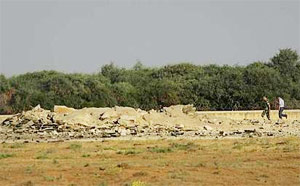
Lebanese men inspecting the damage to a runway at Rafik Hariri International Airport in Beirut on Thursday, after it was hit in an IAF strike. (AP)
Hezbollah: We’ll strike Haifa if IAF attacks Beirut
1 killed, dozens hurt as Katyushas fall in north; Israel imposes sea and air blockade on Lebanon
One person was killed and dozens were wounded Thursday when Katyusha rockets fired by Hezbollah guerillas rained down across northern Israel.
In Nahariya, a woman died when a rocket struck her home. Another 29 people were hurt, including a number of children. Most of the casualties were lightly wounded; one person sustained serious wounds.
At least 11 people were wounded Thursday afternoon when a fresh barrage of Katyusha rockets fired from Lebanon struck the northern town of Safed.
Of the wounded, one person was seriously hurt, another sustained moderate wounds, two people were lightly hurt and seven were treated for shock.
Rockets also fell in the town of Carmiel, but there were no injuries. In the nearby village of Majdal Qrum, one person was moderately hurt by a rocket.
A resident of the northern town of Zirit was also lightly wounded by a Katyusha on Thursday morning.
Meanwhile, Israel threatened Thursday to strike at Hezbollah offices in a residential area of Beirut in response to Katyusha strikes on population centers inside Israel.
In response, Hezbollah said that it would target the major northern port city of Haifa.
Israel Air Force jets Thursday morning carried out flybys over the area, which is home to senior members of Hezbollah, as well as some of its supporters.
The Israel Defense Forces confirmed that several rockets landed some 15 kilometers south of the border with Lebanon on Thursday morning, signaling that Hezbollah is becoming increasingly successful in expanding the reach of the crude projectiles. This is the furthest that Hezbollah rockets have managed to penetrate inside Israel.
A Katyusha also struck the town of Safed on Thursday. There were no injuries. Hezbollah has declared it has over 10,000 rockets to use against Israel.
The government is working on the assumption that Hezbollah will use rockets with a longer range than they have previously had to strike civilians areas in Israel. Should that happen, the IDF will then consider sending ground troops into Lebanon.
Hezbollah fired another 10 Katyusha rockets overnight at an IDF base on Mount Meron. No injuries were reported in that incident.
The IAF is prepared to strike anywhere in Lebanon, including the capital of Beirut, if the Lebanese government fails to rein in Hezbollah guerrillas, IDF Chief of Staff Dan Halutz said Thursday.
Halutz noted that all senior Hezbollah leaders live and have offices in the southern Beirut neighborhood of Dahiya. He said Beirut could be included among the targets if Hezbollah rockets continue to hit northern Israel. “Nothing is safe [in Lebanon], as simple as that,” he said.
He said the residents of Dahiya should understand the situation and draw the proper conclusions if concerned about their safety.
“We are not at war, but we are in a very high volume crisis, and we have an intention to put an end to the situation here along the northern border,” Halutz told reporters Thursday.
“We are taking the Lebanese government as the one who is carrying all the responsibility on its shoulders regarding this area and regarding the future of Lebanon,” said Halutz.
“The Lebanese government needs to understand that there is a price for its inaction. They need to understand that if they are not able to deal with terror, we will have no choice but to fight with them,” he added.
The IDF began preparing Wednesday night for a widespread aerial assault on Lebanon, after the cabinet approved a “severe” response to the Hezbollah attack on the northern border earlier in the day, which ended with eight soldiers dead and two kidnapped.
Defense Minister Amir Peretz said following the late night meeting that Israel would not allow Hezbollah return to its positions along Lebanon’s border with Israel.
“Beirut is paying the price for its small-minded attitude that has lasted for years,” Peretz said during a special meeting of the Knesset Foreign Affairs and Defense Committee in Tel Aviv on Thursday morning.
In southern Lebanon, at least 36 civilians were reported killed in overnight Israel Air Force attacks, including a family of 10 and another family of seven in the village of Dweir, Lebanese officials said.
Defense officials said Thursday that Israel intended to impose a sea and air blockade on Lebanon. Overnight, Israel Air Force aircraft struck Beirut International Airport, and on Thursday morning naval vessels entered Lebanese territorial waters and blocked access to the country’s ports.
“Since this morning Israeli naval vessels have enforced a full naval closure on Lebanon, because Lebanon’s ports are used to transfer both terrorists and weapons to the terror organizations operating in Lebanon,” an IDF spokesman said.
The airport, in the suburbs of Beirut, was forced to close when a shell crashed shortly on the eastern runway after 6 A.M., airport employees said. Another impact was heard shortly afterward.
A senior airport official announced the facility had been closed and diverted scheduled flights to Cyprus. Cyprus’s Larnaca airport is one of the closest to Beirut, with an estimated 25 minutes flight time.
The IDF confirmed it had struck Beirut airport, saying the facility is “a central hub for the transfer of weapons and supplies to the Hezbollah terrorist organization.”


